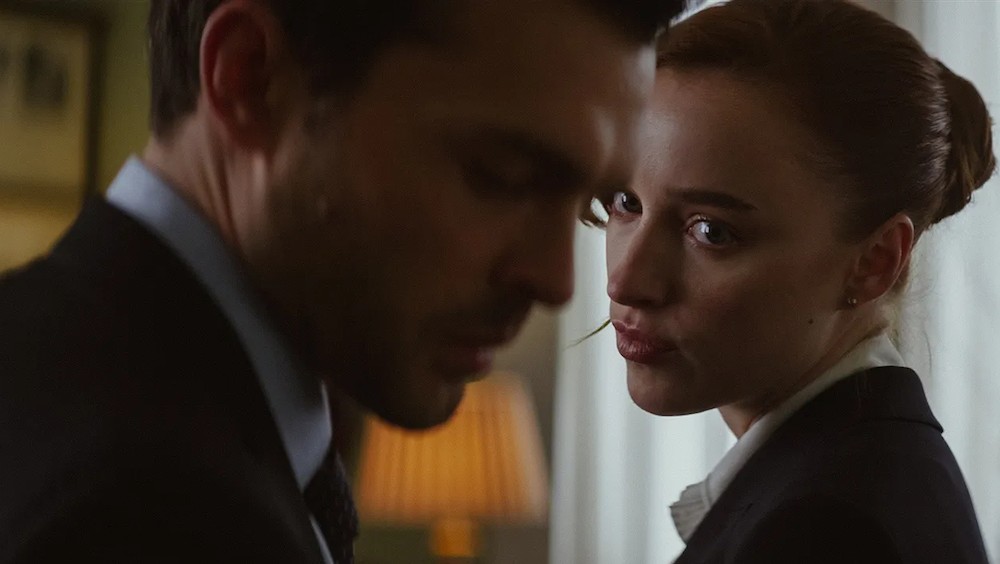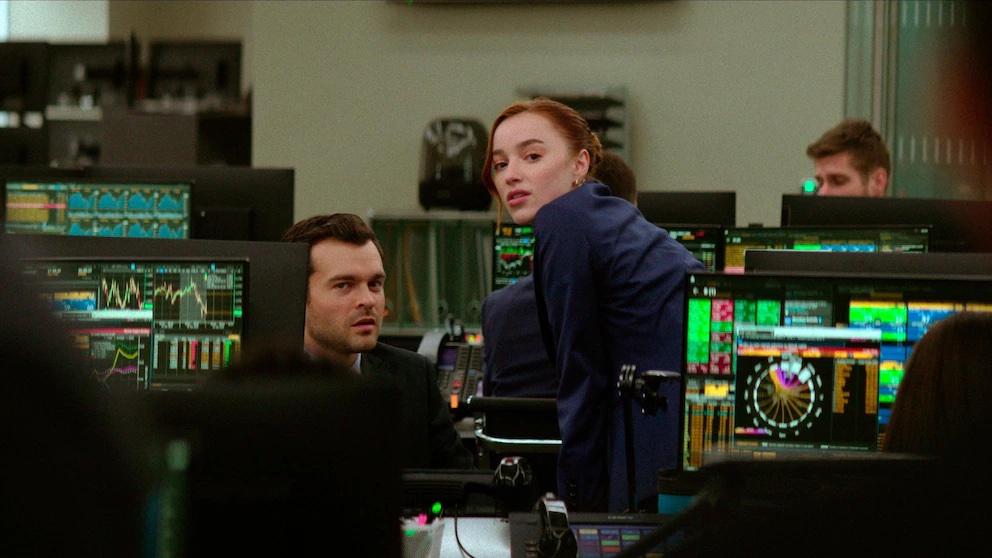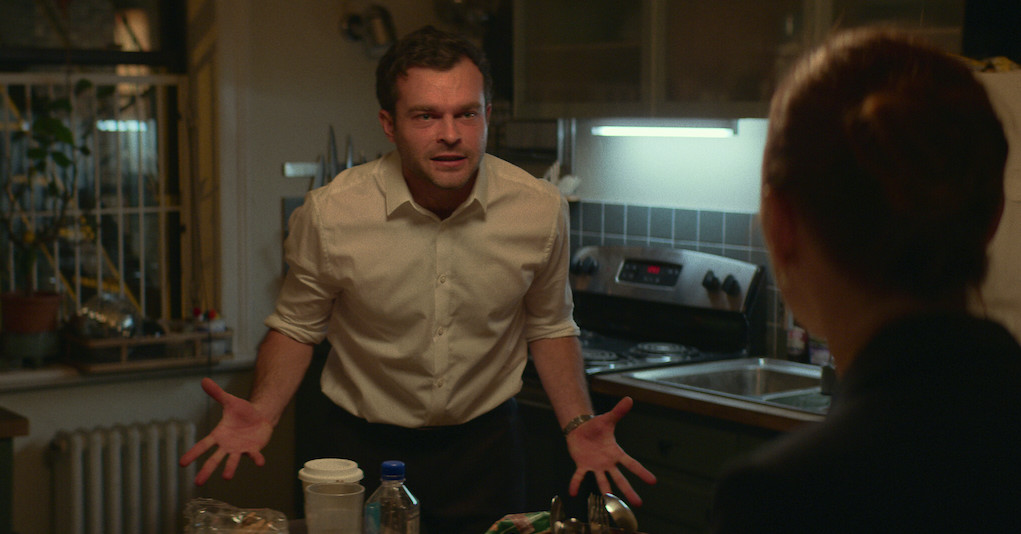
Fair Play is a tightly wound thriller. It’s brute-force, unflinching storytelling from writer-director Chloe Domont, whose provocative film stars Alden Ehrenreich and Phoebe Dynevor as lovers corrupted by greed, insecurities, and ultimately, unspeakable cruelty
Domont and her crew depict a relationship turned sinister with both subtle and occasionally overwhelming atmosphere. For Composer Brian McOmber, a key part of his role was knowing when to dial back the music. The score often matches the characters’ confrontational intensity, while, at others, it speaks volumes through unnerving silence.
McOmber, who has previously composed for Krisha and It Comes at Night, recently discussed his latest score with Below the Line during a pleasant day of gardening.
Below the Line: What were some of the early experiments for the score? What stuck? What didn’t stick?
Brian McOmber: I guess the first experiments were just me messing around with the cello I had in my studio. I have this five string electric cello that is not precious at all. I just started making noise on it, using it, getting sounds out of it, and Chloe just really liked everything I was doing there. It became a percussive score from there on out, but still using strings.
All those sort of early experiments with me just playing sounds for her in the studio, just things that caught her ear, usually textures, some kind of technique I was using. And then the actual musical components and putting those ingredients together came in the months that followed, and by then the picture had started to come together, so I started to score a picture a little bit. And yeah,
BTL: It’s a striking balance of electronic and orchestral. How’d that contrast come about? Fitting for the story.
McOmber: Yeah, the more synth based stuff came later. In the beginning, we were just using ’em as drones to fill out this frequency spectrum that a lot of the acoustic instruments don’t have other than big drums. But I guess towards the end, the electronic components came out and the real purpose of bringing those elements in was to bring a little more lack of better word, emotional resonance to the characters in the beginning of the film.
One of the things we struggled with was all of us, just especially towards the end of the film, really not liking the characters very much. They’re both doing some pretty terrible things, but especially Alden’s character, of course. How can we in the beginning, make the audience at least identify with ’em a little bit, not hate the guy in the beginning? And so, that’s where a lot of the sort of electronic or more song radio elements came in using melody. But other than that, that came after all the early stuff was more in the percussive, classical grid, textural stuff. Rhythmic.

BTL: It’s great when you see a movie and it almost seems like the sound design of the score bleed together. How much were you hearing the final mix or some of the sound design while scoring?
McOmber: It was a rough mix, which was great. So they already did a rough mix before I really got into the nitty gritty of the final stage of the score after we added real strings, things like that. The sound design was already at a rough stage. I knew when there was going to be a loud sound of a train going by, I knew when. And also those sounds, the specific sounds like the train and things, those were solidified early on, so I knew what pitches those were going to be too, and how they moved if they went up or down.
So you could have the music, you could try to base the music coming out of that transition, that same key or something, or to clash with it. We would do a lot of times, create more dissonance. There’s a lot of dissonance also with some of the needle drops that she uses coming in and out. There’s a lot of just dissonance. It’s another element.
But yeah, the sound design, it wasn’t a deep collaboration. It just wasn’t the kind of film that we had the time or money to me giving the sound designer things and sound designer giving me sounds of trains back, and then I could use the train sounds and the music. We didn’t have that quite that amount of time, but I think it came together really well in the end. Also, I just think that the simple sound design moments that we did pay close attention to also worked out, didn’t get too cute.
BTL: There are a lot of heavy silences in the movie as well. From the beginning, did Chloe know exactly which scenes needed to be score-free?
McOmber: For sure. There was even some points where either one of us, maybe me at one point or her would be like, “There should be no music here,” and there was music there a couple times. Those moments got pulled at the very end, which I’m glad about. A lot of times we need less music in this film. Especially for Chloe, she’s sitting in this edit for so long and at some point she just wants to, you become known to it a little bit, and so music is that last thing you do at the end. Sometimes that gives you something you get excited about. Again, it’s new, but oftentimes it just feels, it can feel overcooked or something, or you’re just pushing it too much. There’s plenty going on with the performances, especially with these two actors. Well, everybody’s great, of course. But yeah, a lot of times it was just pulling it back and there was a few times where we just knew there was going to be no music for sure.

BTL: I especially appreciated the silence when people were at computers, you didn’t try to make it sound exciting. It’s mundane.
McOmber: Yeah, we definitely dialed things back. At some points, it’s too much. We don’t need to try that hard sometimes, which is nice. I feel like I’m oftentimes put in the opposite position. “We need more here. We need more music, has to help this scene.” That was just never a problem. It was mostly supporting things.
BTL: “Sometimes we need more for music to help a scene.” When you get that note, what’s your initial reaction to it?
McOmber: It depends. It could be, and this happened in one scene in Fair Play too, but I’ve had this happen in other films where I think that intent that the director had behind the scene, it didn’t plan out, and the performance that the director wanted maybe wasn’t there, but the performance that they got was also really good, just in a different way. Sometimes I feel like, well, I’m reacting to the performance and the music I’m making. It’s not working for you, meaning the director, but maybe consider that [change]. And then I understand later, oh, they want it to be this thing that I’m not seeing there, and maybe I can help make it more that thing.
If it needs to be more frantic and energetic here, and it feels more like a defeat or deflating, how can we do that? Well, we can do that with music. We can add something that picks up the tempo. Maybe it’s ascending and the melody or something, creating more tension rather than letting something sort of resolve.
But yeah, the tricky part sometimes is when a director has such a clear vision of the whole film, and maybe there’s one or two scenes where it’s played a little bit different than they had wanted or had written it, and in the moment, there was an ad lib that they did. I find a lot of directors, some are like, ‘This isn’t what I wrote, but I really like where it’s going. Here. Let’s do this.” Or maybe the reaction is, “This isn’t quite what I wanted. Let’s try to make it more of the thing I wanted.”
Those moments happen at least once or twice in every film, but sometimes the whole film, I wanted more or less energy out of a performance, or I wanted them to be bigger or smaller than they came out sometimes. Usually, it’s just a little tweak. Can we have that music make that performance bigger or can we have it, the music sort of make it smaller or maybe we don’t need music at all? Those are tough questions.
BTL: Have you had this experience before of hearing your score streamed on Netflix?
McOmber: Not this one yet. No. I’ve had another one.
BTL: How is it? I guess it partly depends on the stereos, but how’s it for you?
McOmber: Yeah, it’s fine, I guess.
BTL: That a loaded fine.
McOmber: Yeah.

BTL: [laughs] I’ll leave it there. My last question for you, was that joint you were smoking when we got on the Zoom call?
McOmber: Yeah, it was. I’m just getting a little high and doing some gardening today.
BTL: Oh, that sounds lovely. Do you smoke a lot when you make music? Is it a part of your process?
McOmber: Sometimes, yeah. I mean, not all the time. Sometimes, yeah. I mean, ever since one of the things that I used to do in college, one of the things that it was always the most fun. I was kind of a nerd in college and studied all day, but at night I would just get high and play pickup soccer. And also during college, on the weekends, I’d go back home and play music with my childhood friends, and we would just get high, and oftentimes we’d play songs, but most of that was getting high and improvising, and soccer’s like that too. It’s a really improvisatory sport and in a musical setting, just getting together, getting high jamming… I know it sounds terrible, like some Grateful Dead kind of shit.
BTL: [laughs] Hey, I love the Dead.
McOmber: I love everything about… I always say I really truly love everything about Grateful Dead, but a lot of the music I just don’t like. But within that context of just experimenting with things, experimenting with studio things a lot of times too, just getting high in a studio environment, that is really fun. Just jamming with your friends and collaborating, that was a formative part of, I think, my musical experience as a younger person.
BTL: So, make sure to stick to having fun as a composer.
McOmber: Having fun, just playing music, all kinds of music with different people, sometimes getting high, sometimes having a couple drinks, whatever it’s all about. I think especially as a younger person, if it’s not fun for you, then why are you doing it?
BTL: What about when it isn’t fun?
McOmber: Well, it can be not fun, and I’ve had a lot of unpleasant experiences where you can be caught in the middle of a creative disagreement between a director or producers or producers between each other. Those kinds of things are always awkward, and it can make the job kind of suck sometimes, but at the root of it, playing music is fun, and writing music is fun.
To learn how to do this and to produce music specifically and to collaborate on this level, it just takes time and experience, I think, to be able to wear all those hats. I’ve worked with a lot of different people. For me, again, going back, having different friends and doing different kind of improvisatory collaborative group projects. Mostly it was bands, right? It’s pretty simple for me.
I think that’s so important to learning how to be a collaborator. Film is such a collaborative thing as opposed to say, just being a songwriter. It doesn’t have to be that collaborative as a songwriter, it can be, but it doesn’t have to be the nature of filmmaking, sort of doing film scores. I mean, it just has to be. And so, that’s a skill that it’s hard to teach without just doing it.
Fair Play is now available to stream on Netflix.





